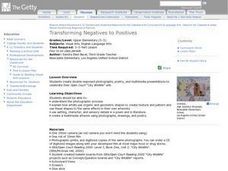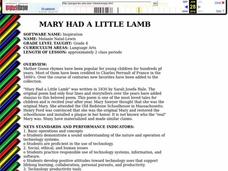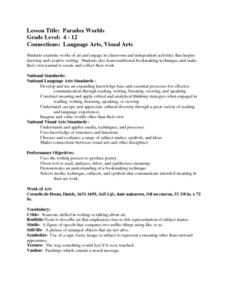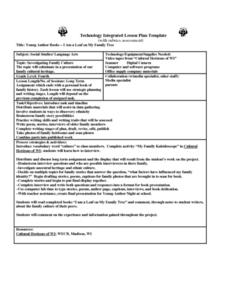Curated OER
Rhyming Words
In this rhyming words worksheet, 4th graders complete activities such as circling rhyming words, writing rhyming words, and more. Students complete 6 activities.
Curated OER
Transforming Negatives to Positives
Students create double-exposed photographs, poetry, and multimedia presentations to celebrate their Open Court "City Wildlife" unit.
Curated OER
A Little Alliteration
For this poetry lesson plan, young scholars listen to stories that contain alliteration. While listening to stories, student pairs make a list of words that they then use to construct "silly sentences" that contain alliteration. Each...
Curated OER
What Smells?
Students read the poem "Light" together and then discuss how poetry can come from anywhere.
Curated OER
Forms Of Knowledge
Learners put writing pieces into categories to show different organizational features in writing. In this writing lesson plan, students are shown examples of speeches, poems, editorials, cartoons, parodies, historical fiction, and more.
Curated OER
Sight Words on a Snowy Evening
Students read various poems by Robert Frost. In groups, they use the text of one poem to identify sight words that are new to them. As a class, they listen to a recording of the poem and then repeating it outloud practicing their...
Curated OER
Basketball for Better Verse
Students listen to and read stories about basketball. They write poetry about basketball.
Curated OER
Online Project Center
Students write two haiku poems in appropriate form. Writing haiku allows students to practice in the skills of dividing words into syllables, counting syllables, and searching for words to fit a structure.
Curated OER
Write to Music
Students improve their creative writing skills. In this writing skills lesson, students learn about picture captions, story writing, critiques, poems, reports, letter writing, creative writing, and a rap poem.
Curated OER
Thankful List
Students practice using free association as a pre-writing technique as they list things that they are thankful for. They share the lists of words and apply them when they write a descriptive essay or poem after identifying commonalities...
Curated OER
Mary Had A Little Lamb
Fourth graders listen and observe the role play of the various versions of the poem. They take notes while listening and observing and develop their own versions of "Mary Had a Little Lamb".
Curated OER
Paradox Worlds
Students view and analyze "Still Life," by Cornelis de Heem. They answer discussion questions about the painting, write similes, discuss symbolism, create a still life sketch, and create a paint box poem.
Curated OER
Young Author Books: I Am a Leaf on My Family Tree
Fourth graders create family tree books. They discuss culture and brainstorm interview questions for family members. They write stories, poems, and captions for family photos. They interview family members and assemble the interviews...
Curated OER
Fall Similes
Students create descriptive autumn similes and write them on fall-themed paper. They first write the autumn simile, and then arrange the plants around the border of the paper. They use natural plants which must be pressed.
Curated OER
Sea Turtle
Students listen to a story about a sea turtle sanctuary. They participate in a discussion about the sea turtles. They analyze some of the hazards that can hurt sea turtles and brainstorm ways to help the problem. They write and...
Curated OER
Fictional Hereos
Students are introduced to the definition of a hero. As a class, they compare and contrast the difference between non-fictional and fictional hereos they have read about. They read a story, create a story map of one of the heroes and...

















